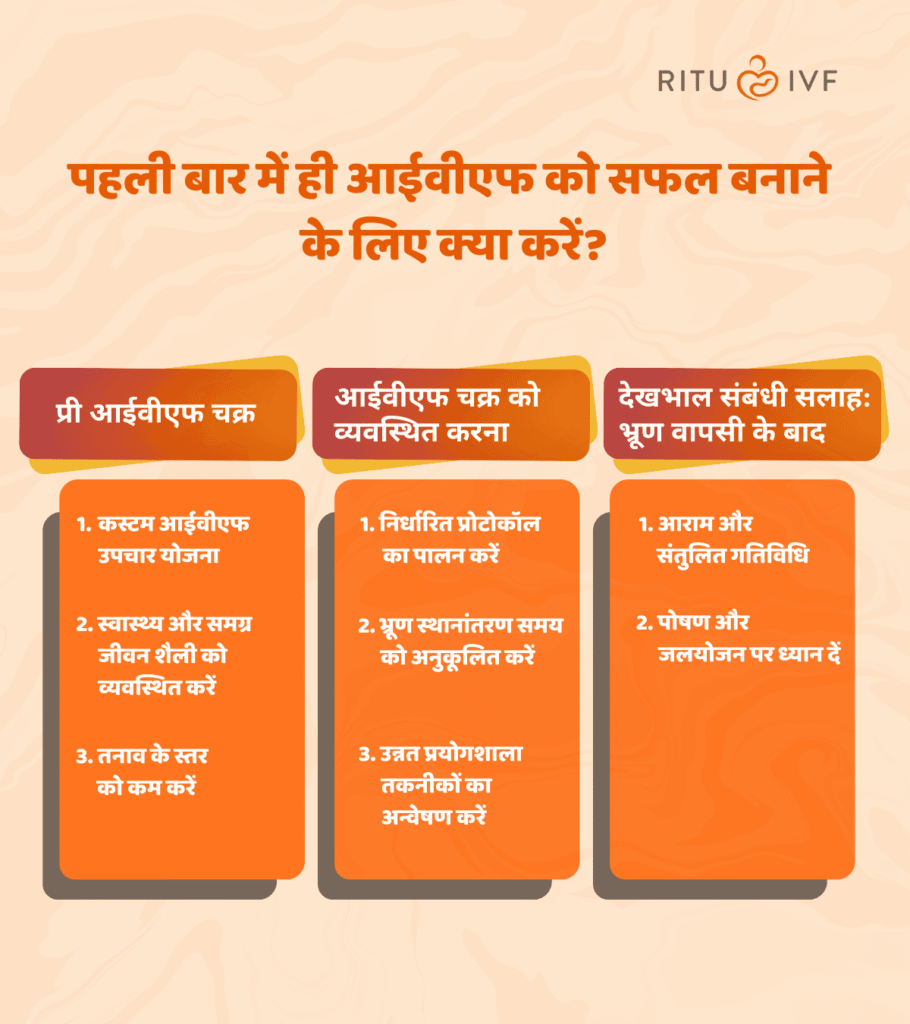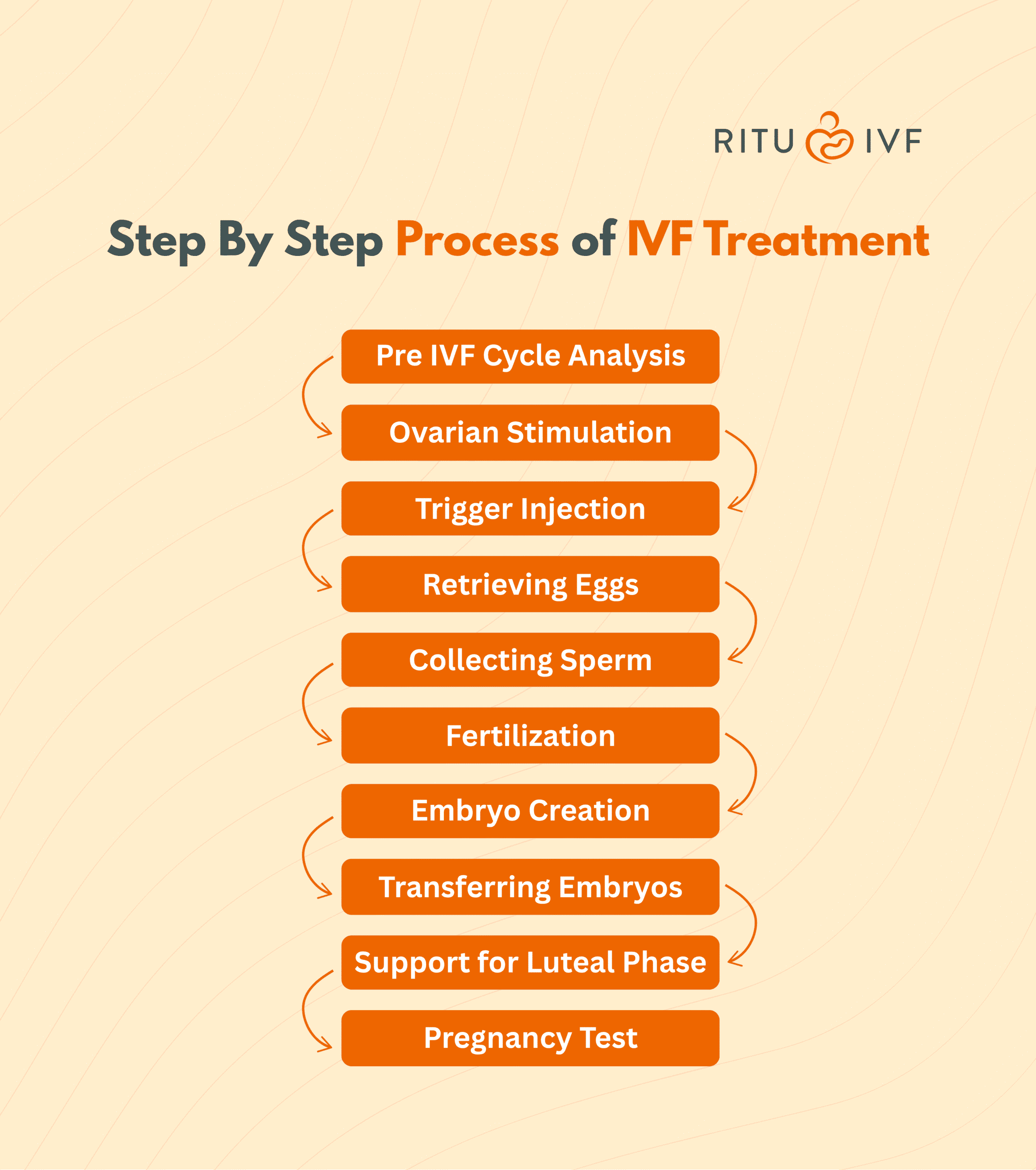प्रजनन के इच्छुक दम्पत्तियों और व्यक्तियों के लिए इन-विट्रो फर्टिलाइजेशन (IVF) एक जीवन बदलने वाली यात्रा है। यह प्रक्रिया शारीरिक, भावनात्मक और आर्थिक रूप से काफी जटिल है, इसलिए ज़्यादातर लोग पहले ही प्रयास में सफलता की संभावना बढ़ाना चाहते हैं। आज हम इसी विषय पर बात करने वाले हैं कि आईवीएफ को सफल कैसे बनाएँ और खासकर पहली बार में ही बेहतर परिणाम कैसे प्राप्त करें। यह सिर्फ़ एक चिकित्सीय प्रक्रिया से कहीं ज़्यादा है; इसमें उचित जीवनशैली में बदलाव, सही क्लिनिक का चयन, और शरीर और दिमाग की तैयारी भी शामिल है।
इस ब्लॉग पोस्ट में, हम विस्तार से जानेंगे कि IVF की सफलता की संभावना किन बातों पर निर्भर करती है – जैसे आपकी उम्र, खानपान, मेडिकल हिस्ट्री, तनाव का स्तर, और आपके फर्टिलिटी डॉक्टर का अनुभव। तैयारी के लिए एक समग्र दृष्टिकोण अपनाकर, जिसमें भावनात्मक स्वास्थ्य, शारीरिक स्वास्थ्य और सोच-समझकर निर्णय लेना शामिल है, आप सफल प्रक्रिया की संभावनाओं को बहुत बढ़ा सकते हैं। एक सक्रिय दृष्टिकोण अपनाने से न सिर्फ़ पहले ही प्रयास में IVF के सफल होने की संभावना बढ़ जाती है, बल्कि समग्र IVF अनुभव भी बेहतर होता है। तो आइए, जानें कि आप अपनी IVF यात्रा को कैसे सफल बना सकते हैं।
पहले प्रयास में IVF की सफलता दर का निर्धारण
IVF की सफलता दर को समझना कई कारकों की वजह से जटिल हो सकता है, जिनमें उम्र, जीवनशैली, स्वास्थ्य और महत्त्वपूर्ण फर्टिलिटी फैक्टर शामिल हैं। औसतन, 35 साल से कम उम्र की महिलाओं में पहले प्रयास में IVF की सफलता दर 40 से 50% होती है, हालांकि बढ़ती उम्र के साथ सफलता की दर कम हो सकती है।
30 के दशक के अंतिम पड़ाव से लेकर 40 के दशक की शुरुआत की महिलाओं के लिए, सफलता दर आम तौर पर 20 से 30% के बीच होती है और 42 साल की उम्र के बाद इसमें और भी गिरावट आती है। अंडों और शुक्राणुओं की गुणवत्ता, डॉक्टरी सलाह का पालन और गर्भाशय का स्वास्थ्य जैसे कारक पहली बार IVF करवाने वालों की तैयारी में महत्वपूर्ण भूमिका निभाते हैं।
हालांकि, यह याद रखना ज़रूरी है कि पहला साइकिल हमेशा गर्भावस्था का कारण नहीं बन सकता। IVF एक चिकित्सीय प्रक्रिया है, और जब अतिरिक्त प्रयास किए जाते हैं, तो सफलता की संभावना बढ़ जाती है। IVF की सफलता के मुख्य तत्त्वों में स्वस्थ जीवन जीना, तनाव को नियंत्रित करना, डॉक्टर की सलाह का पालन करना और सही फर्टिलिटी क्लिनिक चुनना शामिल है।
पहली बार में IVF कैसे सफल बनाएँ? जानें सबसे असरदार तरीके।

आज कई दम्पत्तियों का सपना IVF के ज़रिए परिवार शुरू करने का होता है, लेकिन पहली बार में सफलता की संभावना को ज़्यादा से ज़्यादा करने के लिए सोच-समझकर निर्णय लेने और सावधानीपूर्वक योजना बनाने की ज़रूरत होती है। पहली बार में IVF की सफलता के लिए ये सुझाव स्वास्थ्य में सुधार, सही योजना बनाने, डॉक्टर की सलाह का पालन करने और सफलता की संभावना को बढ़ाने पर ध्यान केंद्रित करते हैं।
A) IVF साइकिल से पहले
कस्टमाइज़्ड IVF उपचार योजना
हर दम्पत्ति की अपनी फर्टिलिटी यात्रा होती है, इसलिए एक व्यक्तिगत योजना का होना बहुत ज़रूरी है। पहला कदम अक्सर पूरी फर्टिलिटी जाँच होती है। महिलाओं के लिए, इसमें आम तौर पर ओवेरियन रिज़र्व की जाँच, अल्ट्रासाउंड और हार्मोन के स्तर का संयोजन शामिल होता है, जिससे डॉक्टरों को एक बेहतरीन उपचार योजना तैयार करने में मदद मिलती है। पुरुषों के लिए, वीर्य विश्लेषण (सीमेन एनालिसिस) से शुक्राणु की गुणवत्ता की पुष्टि होती है और किसी भी ऐसी असामान्यता की पहचान होती है, जिसे IVF उपचार से पहले ठीक करने की ज़रूरत हो सकती है।
इस स्तर पर, किसी भी चिकित्सीय समस्या को ठीक करना बहुत ज़रूरी है। थायरॉयड असंतुलन, मधुमेह या विटामिन डी की कमी जैसी चिकित्सीय समस्याएँ, अगर इन्हें ठीक न किया जाए, तो सफलता की संभावना को नकारात्मक रूप से प्रभावित कर सकती हैं। संभावित समस्याओं को जल्दी पहचानकर और उन्हें ठीक करके, दम्पत्ति और व्यक्ति अपने IVF साइकिल के लिए एक मज़बूत नींव रख सकते हैं। हालाँकि, सही उम्मीदें रखना और हर चरण में क्या उम्मीद करनी है, इस बारे में जागरूक रहना आपको भावनात्मक रूप से तैयार होने और आपके समग्र अनुभव को बेहतर बनाने में मदद कर सकता है।
स्वास्थ्य और समग्र जीवनशैली को बेहतर बनाना
IVF साइकिल शुरू करने से पहले, स्वास्थ्य को प्राथमिकता देना ज़रूरी है। खान-पान और IVF की सफलता पर बहुत ज़ोर दें और लीन प्रोटीन, स्वस्थ वसा, साबुत अनाज, फल और सब्जियों से भरपूर संतुलित आहार लें, जो प्रजनन क्षमता को बढ़ाते हैं और आपके शरीर को उपचार के लिए तैयार करते हैं। प्रसंस्कृत भोजन, कैफीन और चीनी को कम करने से अंडे और शुक्राणु के विकास के लिए एक स्वस्थ वातावरण बन सकता है।
खान-पान के अलावा, आप IVF की सफलता के लिए जीवनशैली में बदलाव करने पर भी विचार कर सकते हैं। जिन व्यक्तियों का वज़न कम या ज़्यादा है, उनमें हार्मोनल असंतुलन हो सकता है, जिससे प्रजनन क्षमता कम हो सकती है। एक स्वस्थ जीवनशैली में नियमित व्यायाम (पैदल चलना, योग या हल्का कार्डियो) भी शामिल है। IVF की सफलता में नींद का महत्त्व शरीर को हार्मोन और रक्त प्रवाह को नियंत्रित करने की अनुमति देने की क्षमता में निहित है। व्यायाम का एक स्वस्थ संतुलन बनाए रखने से (अत्यधिक गतिविधि के बिना) शरीर को ठीक से ओव्यूलेट करने और अपनी प्रजनन क्षमता को बनाए रखने में मदद मिलेगी।
तनाव के स्तर को कम करें
IVF की प्रक्रिया भावनात्मक रूप से थका देने वाली हो सकती है, और ज़्यादा तनाव का स्तर आपके हार्मोनल संतुलन और प्रजनन स्वास्थ्य पर प्रतिकूल प्रभाव डाल सकता है। IVF के दौरान तनाव को प्रबंधित करना, जैसे कि माइंडफुलनेस का अभ्यास करना, ध्यान या गहरी साँस लेने के व्यायाम से आपके दिमाग को शांत करने और IVF उपचार से गुज़रने के लिए तैयार करने में मदद मिल सकती है।
अपने साथी के साथ संवाद करने और विशिष्ट उपचार से अतिरिक्त सहायता लेने के तरीकों को ढूँढना भी प्रोत्साहित किया जाएगा। तनाव को कम करने के लिए एक मज़बूत भावनात्मक सहायता प्रणाली स्थापित करना IVF प्रक्रिया को प्रबंधित करने और परिणामों को बेहतर बनाने के लिए ज़रूरी है। इसके अलावा, हमारी फर्टिलिटी यात्राओं के दौरान सकारात्मक दृष्टिकोण अपनाना फायदेमंद हो सकता है।
B) IVF साइकिल को बेहतर बनाना
निर्धारित प्रोटोकॉल का पालन करें
सही रास्ते पर बने रहने के लिए फर्टिलिटी टीम द्वारा दिए गए दवा योजना और जीवनशैली की सिफ़ारिशों का पालन करना ज़रूरी है; एक डोज़ भूलना या चिकित्सीय सलाह का पालन न करना आपके IVF साइकिल को बदल देगा और आपकी सफलता की संभावना को कम कर देगा।
इसके अलावा, मरीज़ों को अपने डॉक्टर के साथ नियमित रूप से संवाद बनाए रखना चाहिए, सवाल पूछने चाहिए और सभी निर्धारित अपॉइंटमेंट में जाना चाहिए। यह दृष्टिकोण आपको अपनी IVF के ज़रिए यात्रा का लाभ उठाने और उसे बेहतर बनाने में मदद करने के लिए समस्याओं को जल्दी पहचानने और ठीक करने में मदद करेगा।
भ्रूण स्थानांतरण के समय को बेहतर बनाएँ
अगर आप पहले ही प्रयास में सफल होना चाहते हैं, तो भ्रूण स्थानांतरण के समय को सही करना ज़रूरी है। डॉक्टर आम तौर पर आरोपण की संभावनाओं को बेहतर बनाने के लिए गर्भाशय की परत के विकास को भ्रूण की तैयारी से मेल खाने की सलाह देते हैं।
एंडोमेट्रियल रिसेप्टिविटी एनालिसिस (ERA) जैसी विभिन्न विधियाँ यह सुनिश्चित कर सकती हैं कि ट्रायल एंड एरर को कम करने और IVF यात्रा को बेहतर बनाने के लिए स्थानांतरण इष्टतम आरोपण विंडो पर हो रहा है।
आधुनिक लैब तकनीकों के बारे में जानें
टाइम-लैप्स इमेजिंग, ब्लास्टोसिस्ट कल्चर, या ICSI (इंट्रासाइटोप्लाज्मिक स्पर्म इंजेक्शन) जैसी तकनीकें भ्रूण की गुणवत्ता को बढ़ा सकती हैं और पहले IVF साइकिल के सफल होने की संभावनाओं को बढ़ा सकती हैं।
जटिल बांझपन की स्थिति वाले या असफल पिछले प्रयासों वाले दम्पत्ति अनजाने में होने वाली देरी से बचने और अपने पहले IVF साइकिल में भ्रूण आरोपण को बेहतर बनाने में मदद करने के लिए उपलब्ध तकनीकों वाली प्रयोगशाला की सराहना कर सकते हैं।
C) देखभाल संबंधी सलाह: भ्रूण वापस करने के बाद
आराम और संतुलित गतिविधि
भ्रूण को वापस करने के बाद 24-48 घंटों के लिए आराम और राहत की सलाह दी जाती है, जिससे आपके उपचार के बाद अधिकतम रिकवरी समय मिल सके। आपको सख़्त बेड रेस्ट पर रहने की ज़रूरत नहीं है, लेकिन आरोपण के लिए एक सहायक वातावरण बनाने के लिए गतिविधि को कम करना या भारी गतिविधि के बिना हल्की गतिविधि करना मददगार होता है।
धीरे-धीरे चलने और रोज़ाना के काम करने के लिए प्रोत्साहित किया जाता है, क्योंकि ये गतिविधियाँ रक्त संचार में मदद करती हैं और शरीर पर ज़्यादा दबाव नहीं डालती हैं। इसमें अपने शरीर की बात सुनना और एक आरामदेह दिनचर्या में रहना भी शामिल है, जो आपको इस स्तर के दौरान अनावश्यक दबाव को सीमित करने में मदद करेगा।
पोषण और हाइड्रेशन पर ध्यान दें
भ्रूण को स्थानांतरित करने के बाद, एक ऐसे आहार पर ध्यान केंद्रित करें जिसमें सब्ज़ियों, प्रोटीन, साबुत अनाज और ताज़े फलों से पोषक तत्व शामिल हों। ये सभी ऐसे भोजन हैं जो प्रजनन स्वास्थ्य का समर्थन करने के लिए जाने जाते हैं। ओमेगा-3, फोलेट और आयरन से भरपूर भोजन गर्भाशय की परत और आरोपण को मज़बूत करने में सहायता करते हैं।
इसके अलावा, हाइड्रेशन भी उतना ही ज़रूरी है! शरीर के कामकाज के नियमन का समर्थन करने, IVF दवाओं से जुड़ी सूजन को कम करने और प्रजनन स्वास्थ्य का समर्थन करने वाली कोशिकाओं तक पोषक तत्व पहुँचाने के लिए पर्याप्त पानी पिएँ।
यह भी पढ़ें – आईवीएफ प्रेगनेंसी में सफलता पाने के 10 ज़रूरी उपाय
निष्कर्ष
क्या आप सोच रहे हैं कि IVF को पहली बार में ही कैसे सफल बनाया जाए? IVF की सफलता दर चिकित्सीय सलाह, भावनात्मक तैयारी और जीवनशैली के अभ्यासों पर निर्भर करती है। अपने डॉक्टर की सलाह का पालन करके, तनाव को कम करके और एक स्वस्थ जीवनशैली बनाए रखकर, आप सकारात्मक परिणाम प्राप्त करने के लिए सबसे अच्छी संभव परिस्थितियाँ बनाते हैं।
प्रायः पूछे जाने वाले प्रश्न (FAQs)
1. पहले IVF प्रयास में उम्र कितनी ज़रूरी है?
कम उम्र की महिलाओं (<35 वर्ष) में IVF के सफल होने की संभावना ज़्यादा होती है, क्योंकि उनके अंडे बेहतर गुणवत्ता वाले होते हैं।
2. IVF की सफलता में सप्लीमेंट (पूरक) की क्या भूमिका है?
फोलिक एसिड, विटामिन डी, और CoQ10 जैसे सप्लीमेंट IVF चक्र के दौरान शुक्राणु और अंडे दोनों के स्वास्थ्य के लिए फायदेमंद हो सकते हैं।
3. क्या मुझे IVF के दौरान शराब और कैफीन से बचना चाहिए?
हाँ, शराब और कैफीन का सेवन कम करने से आपके उपचार के परिणाम बेहतर होते हैं।






























